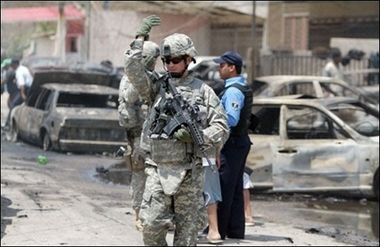America
US Senate to vote on ending war funding
(AP)
Updated: 2007-05-15 08:48
 |
Large Medium Small |
WASHINGTON - Senate Democrats are staging a dramatic anti-war vote this week, with moderates collaborating behind closed doors on legislation that could call on President Bush to rethink his war strategy.
The votes, expected by Wednesday, will probably fall short of the 60-vote threshold usually needed to advance controversial legislation. But they will help Reid, D-Nev., test the Senate's political waters at a time when the Democratic caucus is divided on how far Congress should go to end the war.
"These are important votes," said Reid spokesman Rodell Mollineau. "This will give members an opportunity to debate these issues and have up-or-down votes" on whether to end the war.
Earlier this month, Bush vetoed a $124 billion supplemental bill, which would have funded the war but demanded troops begin coming home on Oct. 1.
Not having enough votes to override the veto but unwilling to back down, House Democrats last week pushed through a new bill that would fund the war only through July. That bill is unlikely to survive the Senate, where several Democrats say they do not want to appear to be turning their backs on the troops by funding combat in installments.
"On our side of the aisle, Democrats believe they should do something very, very close to what was done in the bill that was sent to the president to be vetoed," Reid said.
Accordingly, Reid and Sen. Carl Levin proposed that the Senate vote on legislation demanding troop withdrawals begin on Oct. 1 but allowing Bush to waive that requirement.
Levin, D-Mich., chairman of the Armed Services Committee, called the approach the Senate's "second-best" option. "By providing for the presidential waiver, we are removing any reason for the president to veto the supplemental funding bill," he said.
White House spokeswoman Dana Perino said Bush opposes the Levin amendment.
"Such timelines tie the hands of our commanders, weaken our friends, embolden our enemies and enhance the risk faced by our troops in combat," Perino said. "The bottom line is that a date for retreat is a date for retreat, and the president opposes such provisions."
Under pressure from other more liberal party members, Reid also wants to give members a chance to cut off money for combat operations after March 31, 2008. Reid co-sponsored the legislation earlier this year alongside Sen. Russ Feingold, but he said he would not push it as a caucus position.
"The American people deserve to have the Senate go on record about whether or not it wants to end our misguided mission in Iraq and safely redeploy our brave troops," said Feingold, D-Wis.
The votes come as nearly a dozen Republican senators have been discussing possible legislation on the war, including a proposal by Sen. John Warner that would call on the president to re-evaluate his Iraq strategy if the Baghdad government does not meet certain benchmarks.
"We're trying to put together a single document" that would address concerns of GOP senators, Warner, R-Va., said in an interview.
Warner said he personally backs requiring reports before the August recess and in September on the extent to which Iraqis are making progress on political and security reforms.
Warner said he wants to get a report by July at least "so members of Congress have an evaluation of that situation as they presumably go back to their respective constituencies." If the Baghdad government fails in meeting the benchmarks, "then the president is to determine whether he is to revise the strategy that he laid forward," he added.
Warner said he has been discussing the idea with the group and plans to talk about it Tuesday with Sen. Ben Nelson, D-Neb. The goal, he said, is to develop a proposal that attracts broad bipartisan support.
The list of Republicans working with Warner include Sens. Susan Collins of Maine and Norm Coleman of Minnesota.
Nelson has drafted similar legislation that would go even further. If the Iraqis failed to make progress on certain political and security reforms, the US would cut off reconstruction aid. Under the bill, the president could waive the restriction if he provides public justification.
Nelson's bill also would require the US commander in Iraq to testify by Sept. 15 on whether Bush's troop buildup around Baghdad is working.
"The Senate needs to move forward," Nelson said. "The president has signaled he will accept reasonable benchmarks."
The alliance of Nelson and Warner and other moderates on Iraq is reminiscent of the "Gang of 14," a group of senators who in 2005 drafted a compromise to end a Senate fight on judicial nominations.
| 分享按钮 |

